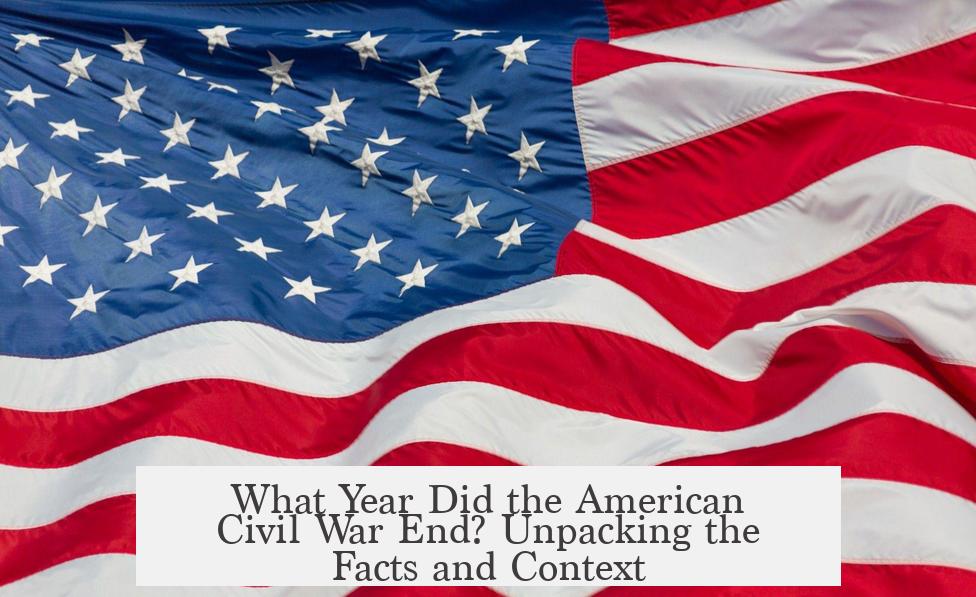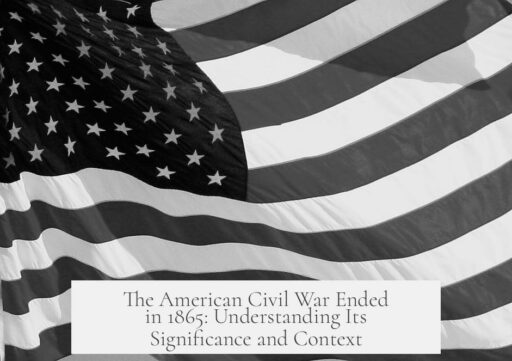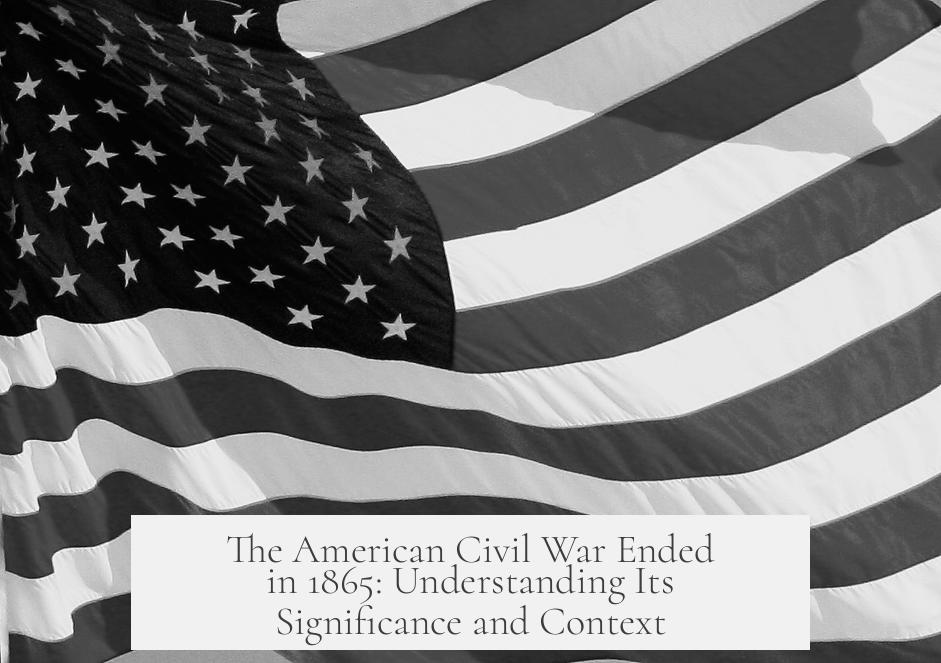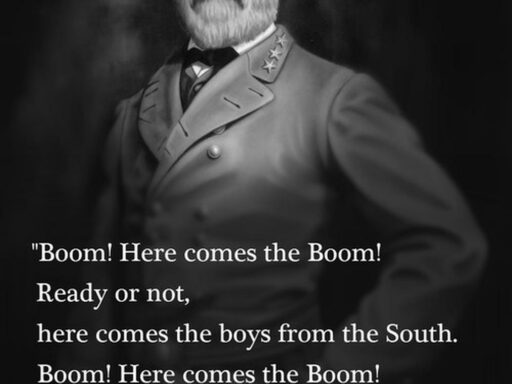The American Civil War ended in 1865. This conflict, which began in 1861, concluded after four years of intense fighting between the Union (Northern states) and the Confederacy (Southern states).
The final major military event marking its end was General Robert E. Lee’s surrender to General Ulysses S. Grant at Appomattox Court House on April 9, 1865. This surrender is widely recognized as the effective conclusion of the war.
Following Lee’s surrender, other Confederate forces also laid down arms in the months that followed, completing the Union’s victory and the restoration of the United States.
This war profoundly affected the nation, leading to the abolition of slavery and reshaping American society and governance.
- The Civil War started in 1861 due to deep divisions over states’ rights and slavery.
- The Union victory helped preserve the United States as a single nation.
- Confederate surrender occurred primarily in 1865, ending active combat.
Key dates related to the end:
| Date | Event |
|---|---|
| April 9, 1865 | Lee surrenders at Appomattox Court House |
| June 23, 1865 | Last Confederate general surrenders |
In short, the Civil War officially ends in 1865, marking a critical turning point in U.S. history.
- End year: 1865
- Major surrender: April 9, 1865
- Last Confederate surrender: June 1865
- Result: Union victory and abolition of slavery
What Year Did the American Civil War End? Unpacking the Facts and Context

The American Civil War officially ended in 1865. If you thought it was some nebulous date whispered in history books, let’s get straight to it — 1865 is the year that sealed the deal, wrapping up the bloodiest conflict on U.S. soil. But wait, there’s more to that story than just a year. Ready for a deeper dive?
The Civil War is often pinpointed to the years 1861 through 1865. But why 1865? What exactly happened that year that signaled the end of a conflict which tore a nation apart? And why must history lovers and students alike keep revisiting this pivotal year?
Setting the Stage: The Civil War Context
Before 1865, the United States was split in half—literally and ideologically. The Northern states (Union) and the Southern states (Confederacy) fought over sovereignty, slavery, and the future definition of America. The war officially began in April 1861, with the Confederate attack on Fort Sumter in South Carolina. For four years, battles raged across fields, towns, and cities, costing hundreds of thousands of lives.
Fast forward to April 1865. The Confederate forces, led by General Robert E. Lee, were staring at defeat. On April 9, 1865, Lee surrendered to Union General Ulysses S. Grant at Appomattox Court House in Virginia. This event is widely regarded as the effective end of the war, though a few scattered skirmishes occurred afterward.
The Significance of 1865
- Lee’s Surrender: This surrender on April 9 marks the turning point where the Confederacy’s ability to continue the war crumbled.
- End of Major Hostilities: Over the next few weeks, multiple Confederate armies laid down arms, signaling a broader end to fighting.
- Political Resolution: In December 1865, the 13th Amendment was ratified, abolishing slavery in the United States—a major outcome of the Union victory.
So while battles technically fizzled out shortly after April 9, 1865, the formal closure came as the nation faced reconstruction and healing—a process that would shape American history profoundly.
Why Do We Fixate on the Exact Year? The Answer Lies in What Ending Means

History loves dates. They are anchors in the sea of narratives. But focusing on “what year did the Civil War end” isn’t just trivia. It’s about understanding when the tides shifted, when the U.S. began rebuilding what it had almost lost forever. 1865 isn’t just a line on a timeline; it’s a reality shift for America.
Think of it this way: If you ask “What year did World War II end?” most will answer 1945 without hesitating. The same applies here. But unlike WWI and WWII, the Civil War’s end saw immediate consequences in the form of societal transformation (think Emancipation and Reconstruction). Those domino effects continue to fuel discussions about race, identity, and citizenship in America today.
What If You Didn’t Know All This? Tips for Remembering the End Year
- Associate it with Lincoln’s Legacy: President Abraham Lincoln was assassinated in April 1865, mere days after the surrender at Appomattox. The closeness of these events makes the year unforgettable.
- Think Reconstruction: Reconstruction started immediately after the war, meaning the end must have been in 1865 since it set the stage for the rebuilding era.
- Recognize the 13th Amendment: It was ratified in 1865, officially outlawing slavery and formalizing the Union’s victory.
Common Confusions and Clarifications
Some people guess the war ended in 1864, thinking of the decisive battles or Sherman’s March to the Sea. Others might say 1866 because Reconstruction extended beyond the fighting. The nuance matters. The formal conclusion, in terms of soldiers ceasing combat and key surrender events, happened in April 1865.
“History is never just a year. But 1865 is the year when American history turned a sharp corner.” — Your friendly neighborhood history enthusiast
So, Is 1865 Just a Date to Memorize?

No way. It’s a portal into understanding the immense challenges the U.S. faced in healing after years of division and strife. Every textbook, museum, and documentary referencing 1865 reminds us that the American story is unfinished work—one focused on unity, justice, and progress.
Now that you know the year, the question is: how does 1865 resonate with you? Does it inspire thoughts about freedom, leadership, or the cost of conflict? History works best when it sparks conversation, so next time someone asks “what year did the American Civil War end?” you’re not just giving an answer—you’re opening a door.
Final Thought
The American Civil War ended in 1865, marked by General Lee’s surrender and the subsequent societal shifts. This year stands as a milestone of closure and a new beginning for the nation. Remember, history isn’t just what happened; it’s how those events shape who we become.
Feeling inspired? Dive deep into 1865. Explore the stories of soldiers, civilians, and leaders. Understand how a single year changed millions of lives and forged the future of a country still defining itself today.




